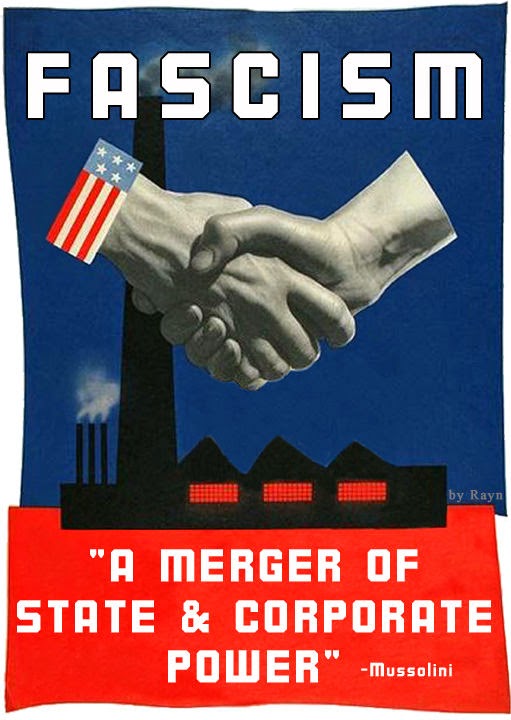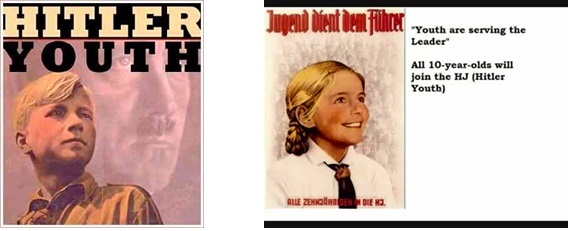« The Alchemy of Language in the Pacification of the American People | Home | High Level Rats Who Bail from the Rat Race: Disillusioned Conservative Cabinet Level and Financial Class Insiders »
What is Fascism?
By Karl North | September 30, 2014
Who cares what fascism is? We in the US should, because elements of it are creeping into our society, activated on an as-needed basis at present to keep its development somewhat below the radar of the masses. Because the term is so often misused, here I will summarize a relatively rigorous conception of fascism like the one used in Marxian political economy. Its rigor is that it is predictable as a stage of capitalism that emerges under certain conditions of severe societal crisis brought on by economic depression at home and loss of power abroad. I will point to its history in Europe and unfolding events in the US today to exemplify what I see as defining characteristics of fascism.
A Stage of Capitalism
In this conception, fascism is a response to severe, systemic crisis in a capitalist society. Capitalist systems are designed ideally to put the common wealth – all property, raw materials, production facilities and distribution of goods and services – in private hands, directly or indirectly under the control of a business and financial oligarchy. In times of crisis, property and most profits remain privatized but some control over production is surrendered to the governing regime. So fascism is not the preferred stage of capitalism, but is adopted when crisis levels demand more authoritarian, centralized control of the economy. In the high crisis levels of WWII, Nazi Germany commanded Mercedes Benz to build tanks instead of cars. And Washington ordered General Motors to do likewise, as part of a ‘war economy’ under government control.
Because fascism is not squarely anti-capitalist, and is in fact a stage of capitalism, capitalists in societies not suffering a fascist stage are sympathetic to fascism in other countries. US and European industrial elites supported the rise of fascism in Germany until and covertly even after the German declaration of war[1]. After the war, they were happy to rehabilitate the fascist regimes of Franco and Salazar in Spain and Portugal that had been allies of the Nazis, quietly reinstate German war criminals to high office or, in the worst cases, allow German and other fascist mass murderers to escape prosecution by emigrating to the Americas. Today the Western ‘democracies’ support the fascist ‘orange revolutions’ in Eastern Europe, including the overtly Nazi current regime orchestrated by Washington in Ukraine. In the attempt to retain control of Arab oil the US Empire has not hesitated to support Muslim extremists to create ethnic conflict, weaken and balkanize anti-imperialist regimes, and make them more compliant. The violently authoritarian, exclusionary character of some of these jihadi groups is an essential ingredient of fascist ideological control. So while fascism is currently only incipient in imperial centers, it is encouraged when necessary to manage imperial control in peripheral client states.
The goal of fascism is to maintain a capitalist system in the face of crisis by adopting a number of authoritarian methods that would not be needed in more normal times.
The trend toward dictatorial government that is characteristic of fascism extends not just to the economy but to all areas of society. In WWII, rationing replaced some capitalist control of markets. So it is likely to occur again in the US as the present crisis deepens. In US law, all the necessary elements of fascist control are already in place. The so-called Patriot Acts enacted during the Bush regime and reconfirmed and extended under Obama end the most basic protections from dictatorship that citizens have, essential civil rights that date back to the Magna Carta.
A Unique Form of Dictatorship
Totalitarian mind control is a cheaper tool of social control than brute force, and is a defining characteristic of fascism. In recent decades the US mainstream media, always under a large degree of capitalist control, align their manufacture of an illusory reality increasingly with the official story coming out of Washington. Increasing censorship[2] and propaganda in schools and other institutions also is used to ‘dumb down’ the public.[3] Oligarchs like the Koch brothers have promoted authoritarian religious fundamentalism to the point where it governs the collective consciousness of nearly half of US citizens, who become foot soldiers waging war against science and voting for public policies that drive the country toward fascism.[4] Media and government control the increasingly illiterate lower classes and ill-informed professional class with a populist message that has only a semblance of substance in policy. In Nazi Germany it was called National Socialism. In the US, socialism has been made a dirty word, so propagandists are left with lame slogans like ‘a return to growth and job creation’.
All sorts of regimes adopt more centralized decision-making in times of crisis. Fascism achieves mind control in a distinctive way; it promotes the myth of national moral or cultural superiority to justify expansionist violence abroad and repression (called ‘national sacrifice’) at home.
It commonly uses myths of racial, religious or ethnic preeminence in this way, as in the Nazi claim of Aryan supremacy, which justified extermination of all groups that they could call ‘untermenschen’ (subhuman) and confiscation of their assets. Aryan supremacy was used to justify the Holocaust and the scorched earth policy of German expansion into Slavic lands by way of systematic massacre, town by town. The US oligarchy today, faced with declining imperial control worldwide, depends ever more heavily on the myth of ‘American Exceptionalism’ – the illusion that our system of government and economy is superior – to justify military invasion and occupation, often dressed up as ‘humanitarian intervention’, to put out fires of resistance to the Empire. Similarly, Zionist fascism relies on scriptural references to a “chosen people” and a “promised land” to justify its conquest of Palestine by ethnic cleansing and its continuing genocidal expansion toward a “Greater Israel”. The US has a long tradition of racism that is being used to promote a fascist mentality. Attempts in recent decades to clean up the rhetoric have caused racists to use less obvious language while promoting their agenda with ever more intensity, as is manifest in increasing police violence in inner cities, prisons, and among immigrant populations.
Increasing regimentation and surveillance at home contribute to totalitarian control. Civil society organizations come increasingly under central control. The Nazis created the Brown-shirts – youth groups like a paramilitary form of Boy Scouts – to indoctrinate the younger generations, and used them to spy on parents and police neighborhoods.
In the digital age surveillance is easier: the agencies like the NSA and compliant internet corporations like Google invisibly blanket the country with constant surveillance, as whistle blowers like Julian Assange and Edward Snowden have revealed. To prevent such revelations the Obama regime has stepped up persecution and prosecution of whistle blowers far more than any previous administration, even reaching out with a long imperial arm to force Sweden to capture and deliver Assange on trumped up charges.
In the name of national security Washington uses the exaggerated threat of international terrorism to scare the nation into tolerating a creeping police state. Police in the US are now equipped and trained to act like an occupation army, and have resorted increasingly to police violence and repressive curfews and lock-downs in isolated instances. Authorities used the Boston marathon bombing, a crime never really solved, to test out and habituate a million-fold urban population to a lock-down and a frightening and sinister house-to-house invasion of privacy by heavily armed militarized personnel.
The Contributory Crisis
At this point the question arises: Is there really a deepening crisis sufficient to be driving US society toward the conception of fascism described above? Indeed a crisis exists that is unprecedented in human history, which has three related elements. Its underlying driver, affecting all nations, is resource depletion and its associated damage to essential ecological services that the global expansion of industrial society has brought about. A temporary 200-year injection of fossil energy has permitted the growth of an industrial civilization whose consumption of resources has now overshot manifold the ability of the planet to sustain it. Those chickens are now coming home to roost. Cheap energy, the enabler of wealth and productivity during this period, is no longer cheap. Nothing happens without out energy. Hence, less energy = less economic activity = less industrial civilization. The inevitable result of over-extension is shrinkage, which is already happening in the mature industrial economies and their less industrialized client states.
The second element is an economic crisis that is partly a function of the depletion just described. In the words of Naomi Klein, “[O]ur economic system and our planetary system are now at war. Or, more accurately, our economy is at war with many forms of life on earth, including human life.”[5] The economy is losing the war; the economic crisis deepens as long as the capitalist system remains in place. The other reason for the economic crisis has to do with the present evolutionary stage of capitalism in the mature industrial economies, the US, the European Union and Japan. In these economies, economic growth has slowed for a number of reasons as a characteristic of maturity. In response, the international financial class is exporting the industrial sector of these economies to more rapidly growing countries with cheaper labor where it can continue to make the high profits to which this class is accustomed. Because industry is the core of an economy, this slows growth in the mature capitalist nations even more. On top of that, the financial class is exploiting one of the remaining sources of financial profit in the mature economies: a massive expansion of credit/debt including high risk speculative investments. These actions prop up the domestic consumer economy and stock market temporarily, and thus mask the crisis with cheap imported goods, but cannot last, and will worsen the inevitable crash.
The third element in the crisis is the addiction to “The American Way of Life” in the mature economies, strongly reinforced by indoctrination to a fairy tale view of reality created by the capitalist controlled media and government. The result is widespread denial of the crisis, generations of people without the skills to adapt to a post-industrial economy, and mass deception/delusion as to the nature of the crisis. In short a zombified populace.
In “Progress”, Blowback and the Future of Industrial Society I have described the three-part crisis summarized above in more detail.
Under these circumstances, when the reality of the crisis hits hard enough, it seems likely that anger in such an ill-informed populace will replace illusions, making many Americans vulnerable to the demagoguery on which fascism thrives. One can only hope that the economic crisis weakens central government in the US enough to preclude the emergence of a powerful fascist state.
[1] The film Remains of the Day is a famous story of collaboration with Nazi Germany in the British aristocracy.
[2] http://www.sott.net/article/251402-Young-Persons-Called-to-Private-Grand-Jury-for-Owning-Books
[3] http://www.theguardian.com/books/2014/sep/26/books-censorship-prisons-schools-free-speech-un-shakespeare
[4] http://www.pewforum.org/2014/09/22/public-sees-religions-influence-waning-2/
[5] This Changes Everything: Capitalism vs. The Climate
Topics: Political and Economic Organization, Social Futures, Peak Oil, Relocalization, Uncategorized | No Comments »




